美国2002年国情咨文
美国国情咨文

美国国情咨文引言美国国情咨文(State of the Union Address)是美国总统每年向国会发表的演讲,旨在向国民汇报过去一年的国家情况,并提出未来一年的政策和目标。
这一演讲通常被视为总统向全国通报国家状况和政府政策的重要机会。
美国国情咨文的内容多样,包括经济、外交、教育、国防等众多领域。
本文将介绍美国国情咨文的历史背景、演讲形式、内容特点以及对国内外的影响。
历史背景美国国情咨文的起源可以追溯到18世纪末的美国独立时期。
根据宪法规定,总统应定期向国会提供关于国家状况的信息。
第一位美国总统乔治·华盛顿于1790年发表了首次国情咨文。
自那时以来,这一传统沿袭至今,每位总统都会在担任总统后的每一年发表国情咨文演讲,以向国民和国会报告过去一年的工作和未来的政策。
演讲形式美国国情咨文通常在国会联席会议上发表,这是一次隆重的演讲仪式。
国会联席会议是参众两院议员和其他政府高级官员的集体聚会,通常在众议院议会大厅举行。
总统在演讲中向听众展示了他的政府在过去一年取得的成就,并提出未来一年的政策目标。
美国国情咨文的演讲形式通常包括以下几个方面:1.演讲书面稿:总统通常会提前准备一份演讲稿,但他们可以根据需要对稿件进行修改和调整。
2.演讲的时长和内容:演讲的时长通常在一小时左右,总统会在演讲中涵盖多个议题,包括经济、外交、国防、教育等。
3.观众和气氛:国会联席会议由众多国会议员和高级政府官员组成,他们为总统的演讲提供了热烈的掌声和回应。
内容特点美国国情咨文的内容非常丰富多样,涵盖了国家的各个方面。
以下是一些常见的国情咨文内容特点:1.经济政策:总统通常会在演讲中讨论国家的经济状况,并提出经济政策的优先事项。
这可能包括税收改革、就业机会、贸易政策等。
2.外交政策:总统会介绍过去一年的外交成就,并谈及未来的外交政策目标。
这可能包括与盟友的关系、国际合作、全球问题等。
3.内政议题:包括医疗保健、教育、移民政策、环境保护等内政议题。
美国的三权分立制度 PPT

在控辩双方盘问证人和辩论结束后,联邦最高法院首席法 官就弹劾指控按姓氏字母顺序一一点名询问每个参议员, 后者只能回答“有罪”或者“无罪”。如果有2/3以上 的参议员,就任何一项指控回答“有罪”,总统即被弹劾; 如果被认定为“无罪”,总统可以继续完成其任期。
(3)由于布什政府不愿限制法、德、俄等国参 与同美国重建伊拉克有关的商业活动,美国众 议院未就限制上述国家的议案提交讨论,这反 映了什么问题?
克林顿和莱温斯基的绯闻案
早在1995年11月,克林顿就在白宫和当上白宫 实习生仅几个月的莱温斯基发生了不正当的关 系。然而,莱温斯基在1997年12月5日为葆拉琼斯控告克林顿性骚扰案作证时,否认与克林 顿有过不正当关系,并且为此签了一份声明。 同月17日,克林顿被琼斯的律师提问时,也否 认与莱温斯基有不正当关系。但是根据白宫访 客记录,克林顿曾在莱温斯基作证之前与她私 下会面,要她在出庭时“避重就轻”,同时还 通过私人秘书取回先前赠送给莱温斯基的多种 礼物。
孟德斯鸠(Charles-Louis de Montesquieu)进一步发 展和完善了洛克的分权学说,主张必须建立三权分立 的政体,按照立法、行政、司法三权分立的原则组成 国家。他说:“要防止滥用权力,就必须以权力约束 权力。”“当立法权和行政权集中在同一机关之手, 自由便不复存在了,因为人们将要害怕这个国王或议 会制定暴虐的法律,并暴虐地执行这些法律”
第三目 三权分立的弊端(如何评价?) (1)三权分立的积极作用 三权分立有它的积极作用,即反对封建专制,维护 民主制并调节资产阶级内部利益。 (2)三权分立的局限性和消极作用 三权分立的弊端体现在①三权的分立和制衡是在资 产阶级内部的权力分配; ②三大国家权力机关相 互扯皮,导致效力底下; ③三权分立在实践中难 以真正贯彻。 (3)三权分立的本质:三权分立的本质是资产阶 级民主制度。
浅析911事件对美国经济的影响
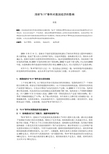
浅析“9.11”事件对美国经济的影响雷震摘要:在美国经济进行阶段性调整的关键时期,“9.11” 恐怖袭击事件的发生为美未来经济发展带来巨大不确定性。
本文从行业生产、外来投资、国民消费趋势等领域深入分析其负面的短期影响,且系统研究了恐怖袭击及反恐行动可能给美国经济带来的中长期影响;并着重分析“9.11”事件发生后美国经济迅速复苏的主要原因,以及未来美伊战争对美经济发展潜在的影响。
关键字:“9.11”事件;经济增长;财政赤字;美伊战争2001年9月11日,恐怖分子劫持美国民航客机袭击了纽约世界贸易大厦和华盛顿五角大楼等地,造成了重大的人员和财产损失,引起世界震惊。
恐怖袭击发生后,国际社会普遍认为,恐怖行动将打击投资者和消费者的信心,扼杀美国缓慢的经济复苏,因此纷纷下调对美经济预测,称2001年美经济增长将下调0.5%,2002年也将下调1.2%,并认为到2003年底,由恐怖袭击事件造成的全部损失预计将达5000亿美元,约占美国民生产总值的5%。
时至今日,“9.11”事件发生已过一年,美反恐也已持续近一载,如何客观评估恐怖袭击给美国经济带来的影响,成为各界专家学者讨论的热门话题。
本文将对此作一浅析。
1.美国经济在“9.11”事件发生前的表现上个世纪90年代,由于新技术革命引发的知识经济的推动,美国经济经历了一个相对较长的增长期,经济运行保持低通胀和高增长。
由于市场对高利润的追逐,投资者对高科技产业投资不断加大,引发以计算机产业为代表的生产过剩。
从2000年下半年开始,美经济增长明显放缓,代表高科技企业的纳斯达克股票指数不断下跌。
美经济进入了周期性调整阶段,并于2001年3月开始陷入衰退,2001年第一季度美国内生产总值下跌约0.6%,第二季度下跌幅度则超过了1.7%。
为了制止经济衰退,布什政府大力推行庞大的减税计划,以期刺激消费,支持经济增长。
在此政策作用下,美投资和消费信心指数一度有所回升,衰退程度也好于预期,比较轻微,但此时“9.11”事件发生了。
伊拉克战争为什么会爆发?
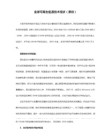
战争爆发以后,中国和俄罗斯等国纷纷要求美国立即停止战争行动,回到政治解决伊拉克问题的轨道上来。法国、德国、比利时等欧洲国家也表示了极度的“遗憾”和“震惊”。联合国在3月26日通过1472号决议,决定继续在伊拉克负责执行“石油换食品”计划,为60%的伊拉克人口提供人道主义援助。与此同时,世界各地掀起了大规模的反战示威游行。伊拉克战争将是21世纪国际关系的一个历史性事件。在1945年以来的国际关系历史进程中,这场战争将至少开创若干个先例:
从2002年1月29日美国总统布什发表国情咨文,明确将伊拉克视为“邪恶轴心”以来,美国就已经开始谋划对萨达姆政府发动军事战争。战争的目的既是为了“解除武装”——彻底杜绝伊拉克的大规模杀伤性武器,也是为了“政府更替”——推翻作为美国在中东最大战略威胁的伊拉克政府。布什政府之所以要“倒萨”,主要有三个原因:一是推行以反对大规模杀伤性武器技术扩散为目的的第二阶段反恐战略,将反扩散与反恐结合起来、将加强美国的战略安全与解决美国视为即时威胁的“流氓国家”结合起来。2002年2月,布什就签署了国家安全行政命令,授权美国情报机构采用包括暗杀、策反和颠覆等在内的一切手段推翻萨达姆政府。二是为了重新组合中东地区局势,拔掉萨达姆这个美国的“眼中钉”,防止伊斯兰恐怖势力与萨达姆这样的反美国家形成联合,并为按照美国的意图重新启动中东和平铺路。三是通过伊拉克战争实现美国国家安全战略向“后9·11时代”的全面过渡,贯彻“先发制人”的新战略原则,试验新的军事装备和战略战术,进一步调整军事力量结构,确立美国在21世纪不受挑战的战略地位。
在这种情况下,国际社会的大多数国家都认为完成联合国在伊拉克问题上的决议目标,最重要的是加强安理会对核查工作的指导,延长核查时间,要求伊拉克完全和无条件地与核查人员合作,保持在联合国框架内和平解决伊拉克问题。然而,美英等国却坚持萨达姆政府继续“欺骗”联合国,强调外交解决时间已经用尽。3月16日,美、英、西、葡四国在大西洋中的亚速尔群岛举行了关于伊拉克问题的四方首脑会晤。“亚速尔会议”最重要的结果是明确了美、英、西三国在安理会继续就伊拉克问题保持外交行动的时间,而这个时间就是3月17日这一天。“亚速尔会议”实质上确立了美国走向伊拉克战争的“亚速尔速度”。由于之前美国未能在安理会争取到通过新决议所需要的9票,而且再继续进行外交拉票工作的结果也不确定,连续遭遇倒萨外交挫折的布什总统不得不再度祭出“鹰派”立场的“杀手锏”,表示只留下一天的时间来确认安理会是否能够就3月7日三国伊拉克问题新议案得出结论。这是给安理会下了“最后通牒”。
2002-2003年美国国家安全战略述评
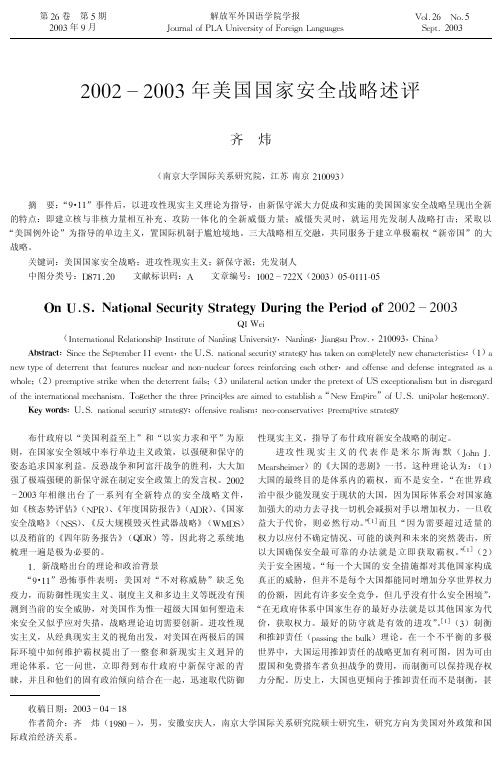
2002-2003年美国国家安全战略述评齐炜(南京大学国际关系研究院,江苏南京2l0093)摘要:“9·ll ”事件后,以进攻性现实主义理论为指导,由新保守派大力促成和实施的美国国家安全战略呈现出全新的特点:即建立核与非核力量相互补充、攻防一体化的全新威慑力量;威慑失灵时,就运用先发制人战略打击;采取以“美国例外论”为指导的单边主义,置国际机制于尴尬境地。
三大战略相互交融,共同服务于建立单极霸权“新帝国”的大战略。
关键词:美国国家安全战略;进攻性现实主义;新保守派;先发制人中图分类号:D 87l.20文献标识码:A文章编号:l002-722X (2003)05-0lll-05O n U .S.national Securit y S trate gy Duri n g t he period of 2002-2003@I W e i(I nternational R e lationsh i p I nstitute o f N an j i n g U n ivers it y ,N an j i n g ,Jian g su P rov.,2l0093,Ch i na )Abstract :S i nce t he S e p te m ber ll event ,t he U .S.national securit y strate gy has taken on com p lete l y neWcharacteristics :(l )aneWt yp e o f deterrent t hat f eatures nuclear and non-nuclear f orces re i nf orci n g each o t her ,and o ff ense and def ense i nte g rated as a Who le ;(2)p ree m p tive stri ke When t he deterrent f ails ;(3)un ilateral action under t he p retext o f U S exce p tionalis m but i n d isre g ard o f t he i nternational m echan is m.T o g et her t he t hree p ri nci p les are ai m ed to estab lish a “N eW em p ire ”o f U .S.un i p o lar he g e m on y .K e y words :U .S.national securit y strate gy ;o ff ens ive realis m ;neo -conservative ;p ree m p tive strate gy 布什政府以“美国利益至上”和“以实力求和平”为原则,在国家安全领域中奉行单边主义政策,以强硬和保守的姿态追求国家利益。
朝核问题
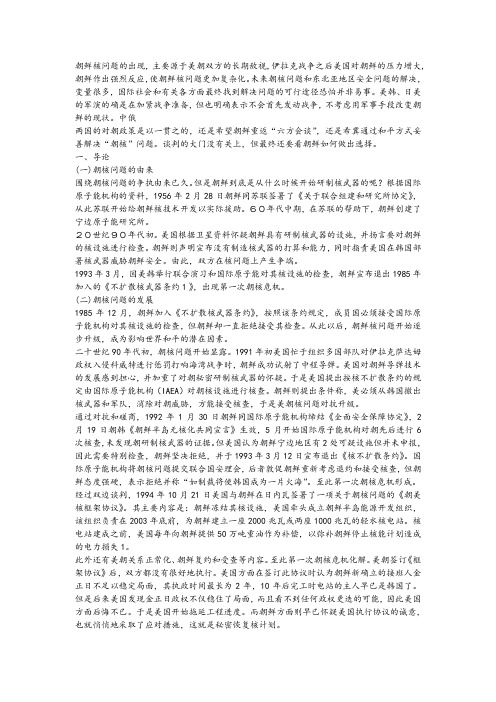
朝鲜核问题的出现,主要源于美朝双方的长期敌视,伊拉克战争之后美国对朝鲜的压力增大,朝鲜作出强烈反应,使朝鲜核问题更加复杂化。
未来朝核问题和东北亚地区安全问题的解决,变量很多,国际社会和有关各方面最终找到解决问题的可行途径恐怕并非易事。
美韩、日美的军演的确是在加紧战争准备,但也明确表示不会首先发动战争,不考虑用军事手段改变朝鲜的现状。
中俄两国的对朝政策是以一贯之的,还是希望朝鲜重返“六方会谈”,还是希冀通过和平方式妥善解决“朝核”问题。
谈判的大门没有关上,但最终还要看朝鲜如何做出选择。
一、导论(一)朝核问题的由来围绕朝核问题的争执由来已久。
但是朝鲜到底是从什么时候开始研制核武器的呢?根据国际原子能机构的资料,1956年2月28日朝鲜同苏联签署了《关于联合组建和研究所协定》,从此苏联开始给朝鲜核技术开发以实际援助。
60年代中期,在苏联的帮助下,朝鲜创建了宁边原子能研究所。
20世纪90年代初。
美国根据卫星资料怀疑朝鲜具有研制核武器的设施,并扬言要对朝鲜的核设施进行检查。
朝鲜则声明宣布没有制造核武器的打算和能力,同时指责美国在韩国部署核武器威胁朝鲜安全。
由此,双方在核问题上产生争端。
1993年3月,因美韩举行联合演习和国际原子能对其核设施的检查,朝鲜宣布退出1985年加入的《不扩散核武器条约1》,出现第一次朝核危机。
(二)朝核问题的发展1985年12月,朝鲜加入《不扩散核武器条约》,按照该条约规定,成员国必须接受国际原子能机构对其核设施的检查,但朝鲜却一直拒绝接受其检查。
从此以后,朝鲜核问题开始逐步升级,成为影响世界和平的潜在因素。
二十世纪90年代初,朝核问题开始显露。
1991年初美国忙于组织多国部队对伊拉克萨达姆政权入侵科威特进行惩罚打响海湾战争时,朝鲜成功试射了中程导弹。
美国对朝鲜导弹技术的发展感到担心,并加重了对朝秘密研制核武器的怀疑。
于是美国提出按核不扩散条约的规定由国际原子能机构(IAEA)对朝核设施进行核查。
2002美国国家安全战略分析
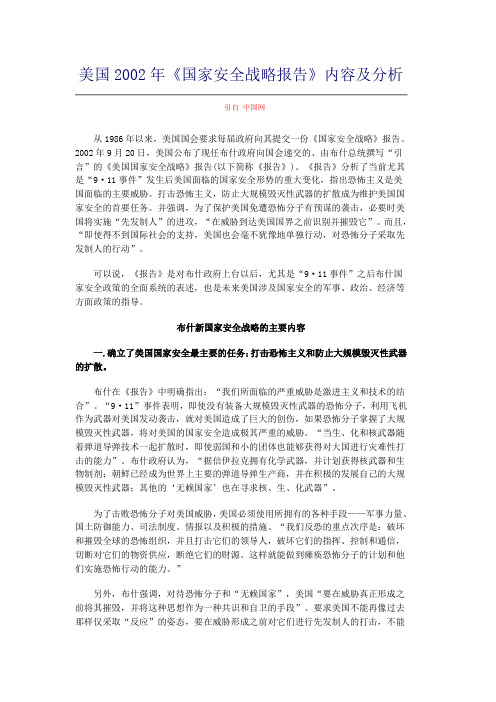
美国2002年《国家安全战略报告》内容及分析引自中国网从1986年以来,美国国会要求每届政府向其提交一份《国家安全战略》报告。
2002年9月20日,美国公布了现任布什政府向国会递交的、由布什总统撰写“引言”的《美国国家安全战略》报告(以下简称《报告》)。
《报告》分析了当前尤其是“9·11事件”发生后美国面临的国家安全形势的重大变化,指出恐怖主义是美国面临的主要威胁。
打击恐怖主义,防止大规模毁灭性武器的扩散成为维护美国国家安全的首要任务。
并强调,为了保护美国免遭恐怖分子有预谋的袭击,必要时美国将实施“先发制人”的进攻,“在威胁到达美国国界之前识别并摧毁它”。
而且,“即使得不到国际社会的支持,美国也会毫不犹豫地单独行动,对恐怖分子采取先发制人的行动”。
可以说,《报告》是对布什政府上台以后,尤其是“9·11事件”之后布什国家安全政策的全面系统的表述,也是未来美国涉及国家安全的军事、政治、经济等方面政策的指导。
布什新国家安全战略的主要内容一.确立了美国国家安全最主要的任务:打击恐怖主义和防止大规模毁灭性武器的扩散。
布什在《报告》中明确指出:“我们所面临的严重威胁是激进主义和技术的结合”。
“9·11”事件表明,即使没有装备大规模毁灭性武器的恐怖分子,利用飞机作为武器对美国发动袭击,就对美国造成了巨大的创伤,如果恐怖分子掌握了大规模毁灭性武器,将对美国的国家安全造成极其严重的威胁。
“当生、化和核武器随着弹道导弹技术一起扩散时,即使弱国和小的团体也能够获得对大国进行灾难性打击的能力”。
布什政府认为,“据信伊拉克拥有化学武器,并计划获得核武器和生物制剂;朝鲜已经成为世界上主要的弹道导弹生产商,并在积极的发展自己的大规模毁灭性武器;其他的‘无赖国家’也在寻求核、生、化武器”。
为了击败恐怖分子对美国威胁,美国必须使用所拥有的各种手段——军事力量、国土防御能力、司法制度、情报以及积极的措施。
2002年国际安全形势综述
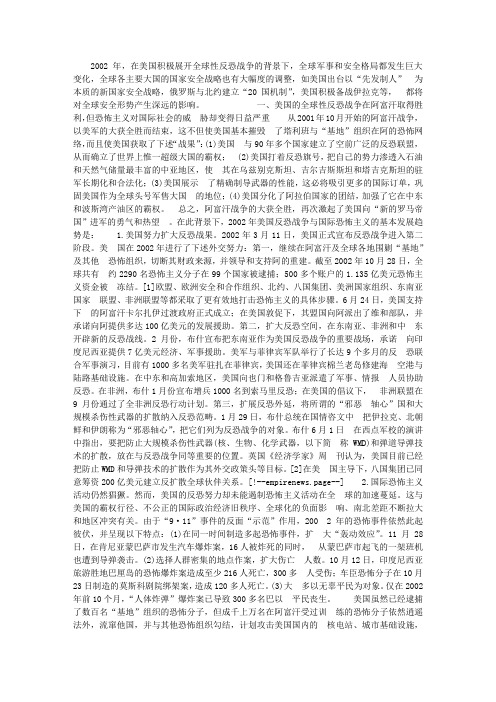
2002年,在美国积极展开全球性反恐战争的背景下,全球军事和安全格局都发生巨大变化,全球各主要大国的国家安全战略也有大幅度的调整,如美国出台以“先发制人”为本质的新国家安全战略,俄罗斯与北约建立“20国机制”,美国积极备战伊拉克等,都将对全球安全形势产生深远的影响。
一、美国的全球性反恐战争在阿富汗取得胜利,但恐怖主义对国际社会的威胁却变得日益严重从2001年10月开始的阿富汗战争,以美军的大获全胜而结束,这不但使美国基本摧毁了塔利班与“基地”组织在阿的恐怖网络,而且使美国获取了下述“战果”:(1)美国与90年多个国家建立了空前广泛的反恐联盟,从而确立了世界上惟一超级大国的霸权;(2)美国打着反恐旗号,把自己的势力渗透入石油和天然气储量最丰富的中亚地区,使其在乌兹别克斯坦、吉尔吉斯斯坦和塔吉克斯坦的驻军长期化和合法化;(3)美国展示了精确制导武器的性能,这必将吸引更多的国际订单,巩固美国作为全球头号军售大国的地位;(4)美国分化了阿拉伯国家的团结,加强了它在中东和波斯湾产油区的霸权。
总之,阿富汗战争的大获全胜,再次激起了美国向“新的罗马帝国”进军的勇气和热望。
在此背景下,2002年美国反恐战争与国际恐怖主义的基本发展趋势是: 1.美国努力扩大反恐战果。
2002年3月11日,美国正式宣布反恐战争进入第二阶段。
美国在2002年进行了下述外交努力:第一,继续在阿富汗及全球各地围剿“基地”及其他恐怖组织,切断其财政来源,并领导和支持阿的重建。
截至2002年10月28日,全球共有约2290名恐怖主义分子在99个国家被逮捕;500多个账户的1.135亿美元恐怖主义资金被冻结。
[1]欧盟、欧洲安全和合作组织、北约、八国集团、美洲国家组织、东南亚国家联盟、非洲联盟等都采取了更有效地打击恐怖主义的具体步骤。
6月24日,美国支持下的阿富汗卡尔扎伊过渡政府正式成立;在美国敦促下,其盟国向阿派出了维和部队,并承诺向阿提供多达100亿美元的发展援助。
美国官方话语的对外传播战略
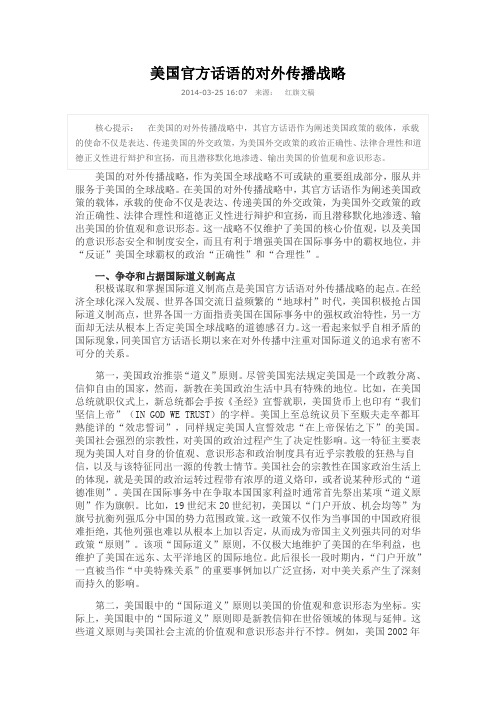
美国官方话语的对外传播战略2014-03-25 16:07来源:红旗文稿核心提示:在美国的对外传播战略中,其官方话语作为阐述美国政策的载体,承载的使命不仅是表达、传递美国的外交政策,为美国外交政策的政治正确性、法律合理性和道德正义性进行辩护和宣扬,而且潜移默化地渗透、输出美国的价值观和意识形态。
美国的对外传播战略,作为美国全球战略不可或缺的重要组成部分,服从并服务于美国的全球战略。
在美国的对外传播战略中,其官方话语作为阐述美国政策的载体,承载的使命不仅是表达、传递美国的外交政策,为美国外交政策的政治正确性、法律合理性和道德正义性进行辩护和宣扬,而且潜移默化地渗透、输出美国的价值观和意识形态。
这一战略不仅维护了美国的核心价值观,以及美国的意识形态安全和制度安全,而且有利于增强美国在国际事务中的霸权地位,并“反证”美国全球霸权的政治“正确性”和“合理性”。
一、争夺和占据国际道义制高点积极谋取和掌握国际道义制高点是美国官方话语对外传播战略的起点。
在经济全球化深入发展、世界各国交流日益频繁的“地球村”时代,美国积极抢占国际道义制高点,世界各国一方面指责美国在国际事务中的强权政治特性,另一方面却无法从根本上否定美国全球战略的道德感召力。
这一看起来似乎自相矛盾的国际现象,同美国官方话语长期以来在对外传播中注重对国际道义的追求有密不可分的关系。
第一,美国政治推崇“道义”原则。
尽管美国宪法规定美国是一个政教分离、信仰自由的国家,然而,新教在美国政治生活中具有特殊的地位。
比如,在美国总统就职仪式上,新总统都会手按《圣经》宣誓就职,美国货币上也印有“我们坚信上帝”(IN GOD WE TRUST)的字样。
美国上至总统议员下至贩夫走卒都耳熟能详的“效忠誓词”,同样规定美国人宣誓效忠“在上帝保佑之下”的美国。
美国社会强烈的宗教性,对美国的政治过程产生了决定性影响。
这一特征主要表现为美国人对自身的价值观、意识形态和政治制度具有近乎宗教般的狂热与自信,以及与该特征同出一源的传教士情节。
伊拉克战争研究
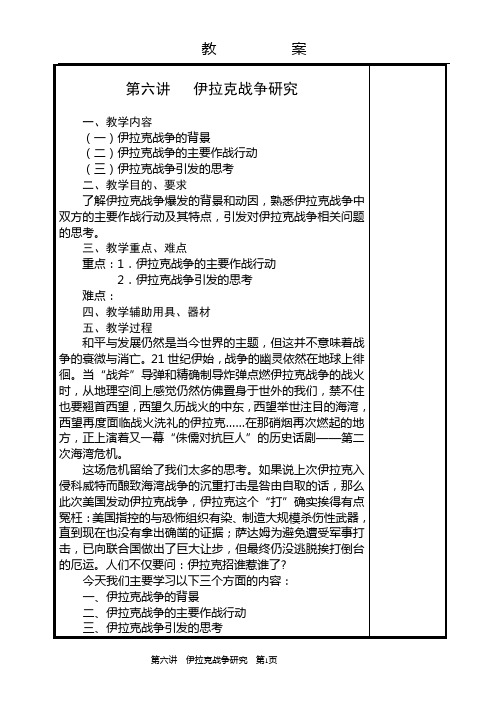
教
案
生巨大变化,以色列与巴勒斯坦的关系也将面临历史性的机 遇。这也从一个侧面证明了美国攻打伊拉克,改变中东格局 是美国和以色列的共同愿望。 石油、以色列和反恐,是中东地区牵动美国神经的三大 石油、以色列和反恐, 因素。 因素。伊拉克战争硝烟未尽,美国就已经开始筹划解决巴以 问题,并迅速公布了中东和平“路线图”计划,敦促巴以重 返和平之路。但是,不解决美国自私自利、双重标准的中东 政策,中东地区的形势只能是雪上加霜。 (五)宿怨之结 第一次海湾战争快要结束的时候,老布什虽曾一度下令 兵临巴格达城下,却在离巴格达仅百余千米处停止推进,并 没有一举推翻萨达姆政权而主动鸣金收兵。老布什当时之所 以做出如此决断, 主要考虑有三:一是联合国授权的目标是恢 复科威特主权, 而非推翻萨达姆政权;二是推翻萨达姆政权可 能导致海湾乃至整个中东格局失衡,引发地区动荡,并导致 反伊联盟破裂,进而破坏建立美国领导下的“世界新秩序” 的战略谋划,美国对这些可能发生的一系列变化当时尚无准 备;三是美国根据情报判定, 萨达姆政权很可能由于国内反对 派的政变、暗杀、民众暴动,以及美国随后推动联合国实施 的制裁和美单方面采取的遏制政策等因素的共同作用而很快 垮台。也就是说,只要在萨达姆头上悬上“武器核查、设立 禁飞区和经济制裁”这三把“利剑” ,伊拉克内部力量必然出 现分化,萨达姆下台指日可待。但十余年过去了,武器核查 断断续续, “禁飞区”屡被突破,经济制裁逐渐分崩离析,萨 达姆依然“稳坐钓鱼台” 。事情大大出乎了美国政府的意料, 原因何在?一是萨达姆的嗅觉异常灵敏,那些想干点大事的 人实际上根本不可能组织一场成功的政变。一位反对派领导 人就失望地说过: “如果你找到3个人组织政变,那么3个人 都会把计划悄悄地告诉萨达姆,这是因为每个人都知道,如 果他不告诉萨达姆,另外两人肯定会告诉。 ”二是萨达姆在伊 拉克人民心中似乎有着无比伟大的形象,伊拉克人民称呼萨 达姆为“伊拉克共和国总统、伟大的领袖、人民的救世主、 先知的子孙、革命指挥委员会主席、伊拉克三军统帅、法律 博士、人民的好伯伯”等等,对萨达姆的官方简历长达19 页,而熟练地背诵这些简历是每一位伊拉克政府官员的必修 课。再比如说,问问去过伊拉克的人,街上什么东西最多, 他们一定回答:塑像,萨达姆的塑像,不同的场合,萨达姆
美国的联邦制、两党制、三权分立和利益集团

美国的两党制,实质上是为资本主 义制度服务的政党制度,是维护资本主 义私有制的经济基础、维护资产阶级利 益的一项政治制度。
两党制
o含义—— o表现—— 两大政党通过竞选争夺执政地位 总统选举 o进步性—— 国会选举
(执政党和在野党) (多数党和少数党)
①相对于专制,可以避免一党独裁和少数人的专制; ②强化了竞争,迫使两党不断地调整对策以适应民众与社会的需求; ③一定程度上提供了民众参与国家政治生活的途径
1933-1945 罗斯福
1929-1933 胡佛 1923-1929 柯立芝 1921-1923 哈定 1913-1921 威尔逊 1909-1913 塔夫脱
民主党
共和党 共和党 共和党 民主党 共和党
1901-1909 西奥多.罗斯福 共和党
你从中寻找到什么结论?
结论:两大政党通过竞选争夺执政党地位, 是一个典型的两党制国家。
提问:美国两党的政治主张为什么有差别?实质呢?
美国两大党为什么要为选票而“不择手段”呢?
政党的命运取决于选票
对于民众,“选票”意味着什么?
提供了民众参与国家政治生活的渠道
美国两党制的实质
1、两党的意识形态和阶级基础没有本质区别。
2、两党在具体议题上的政策和主张虽有明显差 别,但目的是互相牵掣。
3、从民众参与政治生活和执政党的施政过程看, 两党制是资产阶级不同利益集团之间相互监督 和制衡的机制保障。 4、从两党制的运行和竞选费用来看,美国的选 举是有钱人的选举。
结合材料,说明国体和政体的关系
英法两国国体相同,都是资产阶级政权;政体不同, 但都属于资本主义国家的统治形式,都是为资产阶级利 益服务的。这说明国体决定政体,并通过一定的政体来 体现;政体体现国体,并服务于特定的国体,适当的政 体能够巩固国体,不适当的政体会危害国体;由于受历 史渊源、文化传统等因素的影响,政体具有相对独立性。
安然事件的概括
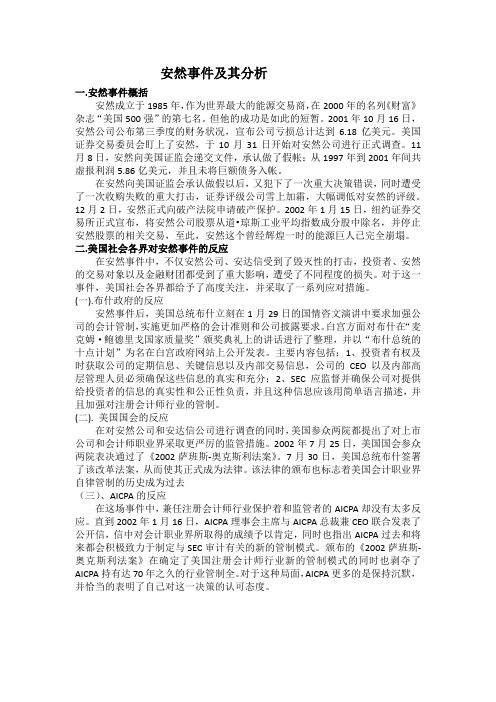
安然事件及其分析一.安然事件概括安然成立于1985年,作为世界最大的能源交易商,在2000年的名列《财富》杂志“美国500强”的第七名。
但他的成功是如此的短暂。
2001年10月16日,安然公司公布第三季度的财务状况,宣布公司亏损总计达到6.18亿美元。
美国证券交易委员会盯上了安然,于10月31日开始对安然公司进行正式调查。
11月8日,安然向美国证监会递交文件,承认做了假帐:从1997年到2001年间共虚报利润5.86亿美元,并且未将巨额债务入帐。
在安然向美国证监会承认做假以后,又犯下了一次重大决策错误,同时遭受了一次收购失败的重大打击,证券评级公司雪上加霜,大幅调低对安然的评级。
12月2日,安然正式向破产法院申请破产保护。
2002年1月15日,纽约证券交易所正式宣布,将安然公司股票从道•琼斯工业平均指数成分股中除名,并停止安然股票的相关交易,至此,安然这个曾经辉煌一时的能源巨人已完全崩塌。
二.美国社会各界对安然事件的反应在安然事件中,不仅安然公司、安达信受到了毁灭性的打击,投资者、安然的交易对象以及金融财团都受到了重大影响,遭受了不同程度的损失。
对于这一事件,美国社会各界都给予了高度关注,并采取了一系列应对措施。
(一).布什政府的反应安然事件后,美国总统布什立刻在1月29日的国情咨文演讲中要求加强公司的会计管制,实施更加严格的会计准则和公司披露要求。
白宫方面对布什在“麦克姆·鲍德里戈国家质量奖”颁奖典礼上的讲话进行了整理,并以“布什总统的十点计划”为名在白宫政府网站上公开发表。
主要内容包括:1、投资者有权及时获取公司的定期信息、关键信息以及内部交易信息,公司的CEO以及内部高层管理人员必须确保这些信息的真实和充分;2、SEC应监督并确保公司对提供给投资者的信息的真实性和公正性负责,并且这种信息应该用简单语言描述,并且加强对注册会计师行业的管制。
(二). 美国国会的反应在对安然公司和安达信公司进行调查的同时,美国参众两院都提出了对上市公司和会计师职业界采取更严厉的监管措施。
美国的三权分立制
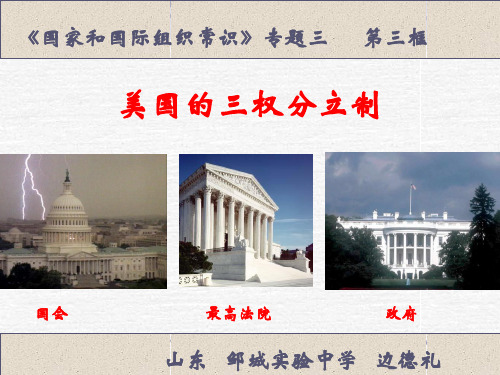
一、三权分立:权力运行的规则
1、美国为什么选择三权分立制度?
美国选择三权分立的政体是由其历史、国情和阶 级本质所决定。
2、三权分立的地位和核心是什么?
3、什么是权力分立?
立法权 行政权 司法权 国会:负责立法,由选民直接选举
产生 产生
总统:负责实施法律,由选民间接选举
联邦法院:负责审查法律,法官由总 统征得参议院同意后任命
按照美国宪法,美国发动对伊战争,需要通过 怎样的法定程序呢?
2002年9月布什总统向国会提交了一份要 求授权对伊动武的决议草案 2002年国会参众两院分别辩论投票表决 通过,授权总统对伊拉克使用武力 2003年3月20日总统宣布对伊作战
结合所学历史知识,回答: 1、“三权分立”思想是谁最早提出来的? 2、“三权分立”原则最早在哪个国家确立?
克林顿和莱温斯基的绯闻案
早在1995年11月,克林顿就在白宫和当上白宫 实习生仅几个月的莱温斯基发生了不正当的关 系。然而,莱温斯基在1997年12月5日为葆拉琼斯控告克林顿性骚扰案作证时,否认与克林 顿有过不正当关系,并且为此签了一份声明。 同月17日,克林顿被琼斯的律师提问时,也否 认与莱温斯基有不正当关系。但是根据白宫访 客记录,克林顿曾在莱温斯基作证之前与她私 下会面,要她在出庭时“避重就轻”,同时还 通过私人秘书取回先前赠送给莱温斯基的多种 礼物。
二、 三种权力的相互制衡(什么是权力制衡?)
(1)立法权属于国会,又受到总统和法院的制约 (2)行政权属于总统,又受到国会和法院的制约 (3)司法权属于法院,又受到国会和总统的制约 (4)三种权力相互制约,保持权力平衡
第三目 三权分立的弊端(如何评价?) (1)三权分立的积极作用 三权分立有它的积极作用,即反对封建专制,维护 民主制并调节资产阶级内部利益。 (2)三权分立的局限性和消极作用 三权分立的弊端体现在①三权的分立和制衡是在资 产阶级内部的权力分配; ②三大国家权力机关相 互扯皮,导致效力底下; ③三权分立在实践中难 以真正贯彻。 (3)三权分立的本质:三权分立的本质是资产阶 级民主制度。
美国的三权分立和利益集团
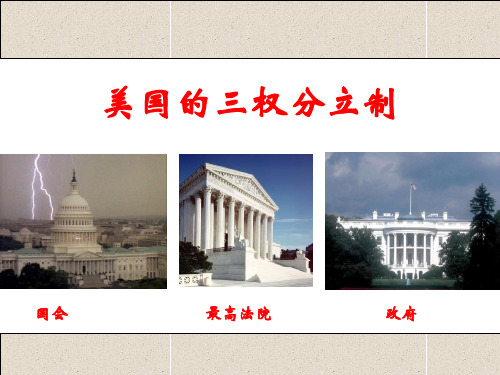
三权分立有它的积极作用,即反对封建专制,维护民主 制并调节资产阶级内部利益
(2)三权分立的局限性和消极作用
①三权的分立和制衡是在资产阶级内部的权力分配; ②三大国家权力机关相互扯皮,导致效力底下; ③三权分立在实践中难以真正贯彻。
(3)三权分立的本质
三权分立的本质是资产阶级民主制度。
1、美国实行三权分立制度的原因
克林顿和莱温斯基的绯闻案
1999年2月12日 在美参议院对克林顿弹劾案进行的最终表决中, 第一项对克林顿作伪证的指控以55票对45票被否决,第二项对 克林顿妨碍司法公正的指控以50票对50票也被否决。这样克林 顿最终被判无罪,这场马拉松式的总统弹劾案宣告结束。
众议院司法委员会表决通过弹劾总统条款 如超过1/2的议员赞成弹劾,该议案即呈参议院 由联邦最高法院首席法官主持审理过程,100名参议员为 弹劾法庭的法官,听取控辩双方的辩论和有关证人的证词
在控辩双方盘问证人和辩论结束后,联邦最高法院首席法 官就弹劾指控按姓氏字母顺序一一点名询问每个参议员, 后者只能回答“有罪”或者“无罪”。如果有2/3以上的 参议员,就任何一项指控回答“有罪”,总统即被弹劾; 如果被认定为“无罪”,总统可以继续完成其任期。
国会不批钱,政府要关门
1995年11月,美国国会与白宫在“平衡预算” 问题上没有达成一致,国会迟迟不批准政府预算, 致使政府的所有行政机构,除了实在关不得的少数 机构之外,其余一律由于没有经费、没有工资而关 门了。当时正值圣诞节,克林顿总统十分狼狈地自 己掏钱付电费,才使得首都华盛顿著名的“第一圣 诞树”的彩灯没有熄灭。这一僵局整整持续了七天。 政府会关门?对于中国人来讲,这像天方夜谭 一样。为什么会出现这种情况?因为在美国,政府 所有的开支都必须经过国会的批准,国会不批准, 政府无法获得一分钱的拨款。因此,如果政府的预 算在国会通不过,那么,政府就无法获得财政拨款, 在没有资金支持的情况下,政府也只好关门。
2002年国际十大新闻盘点
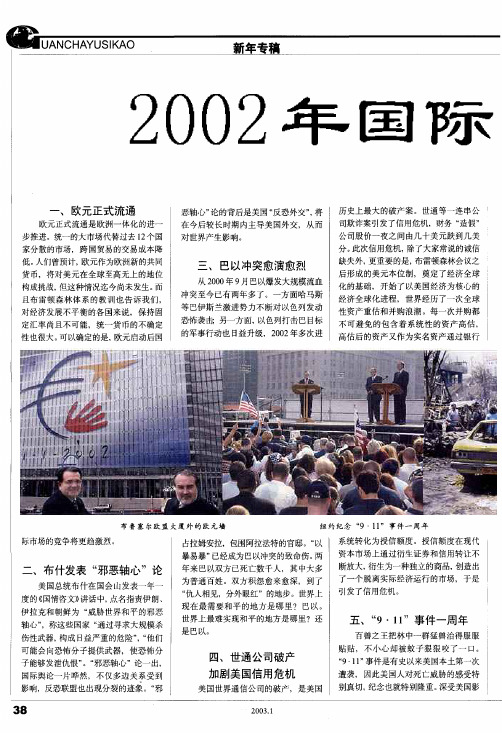
占拉姆安拉,包围阿拉法特的官邸。“以 暴易暴”已经成为巴以冲突的致命伤。两 年来巴 以双方已 死亡数千 人,其中 大多 为普通 百姓。双 方积怨愈 来愈深, 到了 “仇人相见,分外眼红”的地步。世界上 现在 最需 要和 平的 地方 是哪 里?巴 以。 世界上最难实现和平的地方是哪里?还 是巴以。
四、世通公司破产 加剧美国信用危机
历史上 最大的破 产案。世 通等一连 串公 司欺诈案引发了信用危机,财务“造假” 公司股 价一夜之 间由几十 美元跌到 几美 分。此次信用危机,除了大家常说的诚信 缺失外,更重要的是,布雷顿森林会议之 后形成 的美元本 位制,奠 定了经济 全球 化的基 础,开始 了以美国 经济为核 心的 经济全 球化进程 ,世界经 历了一次 全球 性资 产重估和 并购浪 潮。每 一次并购 都 不可避免的 包含着系统性的资 产高估, 高估后 的资产又 作为实名 资产通过 银行
38
2003. 1
十 大 新 闻 盘 白●/,、、 观察记者 周祖文
响的世界也ห้องสมุดไป่ตู้着隆重纪念了一回。“9· 11”事 件一年后 的美国在 世界的影 响更 为加强,阿富汗的基地组织已经鸟兽散, 布什的“反恐外交”大行其道,整个世界 被美 国拖 入了“ 反恐时 代” 。
六、美国连环枪击案
震惊 全美国的 连环枪击 案共有1 0人 被杀,3人受伤。两名枪击案嫌疑犯41岁 的退伍 军人穆罕 默德和他 17岁的养 子马 尔沃后 来被警方 抓获,主 要证据是 嫌犯
国从目前的19个增加到26 个。冷战结束 后,作为冷战的产物的北约,一直在为自 己应该扮演什么角色而苦恼,“9·11”事 件之后 ,世界安 全的威胁 主要来自 恐怖 主义和 大规模杀 伤性武器 。北约显 然不 适应反 恐的需要 。美国在 打击阿富 汗塔 利班政权时,拒绝让北约参与,理由之一 就是北 约过去的 假想、计 划和能力 都过 时了。 北约希望此次 东扩能为北约 指明 方向。
美国的三权分立和利益集团详解
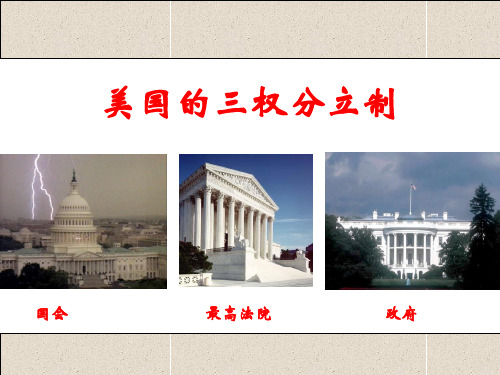
2003年3月,美国的布什政府发动了对伊拉克的战争, 这是布什政府对美国国会于2002年10月7日通过的对 伊战争授权法案的具体执行。2003年4 月,美国国会 众议院再次通过一项为伊拉克战争增拨近800亿美元 的议案(四分之一用于战后重建)。由于法、德、俄 等国反对美国发动对伊战争,所以美国众议院有些议 员认为应对该法案进行修正,即要求禁止法、德俄等 国公司参与同这笔拨款有关的商业活动。但是布什政 府由于考虑到伊拉克战后重建需要各国做出贡献,并 要修复因发动战争 而受影响的美国与上述各国的关系, 不愿为议案附加这样的条件。所以,该修正案未提交 众议院讨论。
如超过1/2的议员赞成弹劾,该议案即呈参议院
由联邦最高法院首席法官主持审理过程,100名参议员为 弹劾法庭的法官,听取控辩双方的辩论和有关证人的证词
在控辩双方盘问证人和辩论结束后,联邦最高法院首席法官 就弹劾指控按姓氏字母顺序一一点名询问每个参议员,后者 只能回答“有罪”或者“无罪”。如果有2/3以上的参议 员,就任何一项指控回答“有罪”,总统即被弹劾;如果被 认定为“无罪”,总统可以继续完成其任期。
(2)三权分立的局限性和消极作用
①三权的分立和制衡是在资产阶级内部的权力分配; ②三大国家权力机关相互扯皮,导致效力底下; ③三权分立在实践中难以真正贯彻。
(3)三权分立的本质
三权分立的本质是资产阶级民主制度。
1、美国实行三权分立制度的原因
美国 三权 分立 制度
2、地位和核心
权力分立 3、内容 权力制衡(制约和平衡)
集团的活动方式,在很大程度上是用金钱购买政治影响力,
是一种滋养腐败的行为——从利益集团对政府的负面影 响看。
3、利益集团机制的隐蔽性、欺骗性及其实质
美国政坛中的利益集团机制,是资产阶级 控制国家机器的一种特殊形式,具有相当强的 隐蔽性和欺骗性。表面上看,利益集团是所谓 的“民意代表”,向政府反映各阶层、群体的 观点和利益,实质上是资产阶级在“民意”的 幌子下控制权力。
美国总统奥巴马国情咨文原文
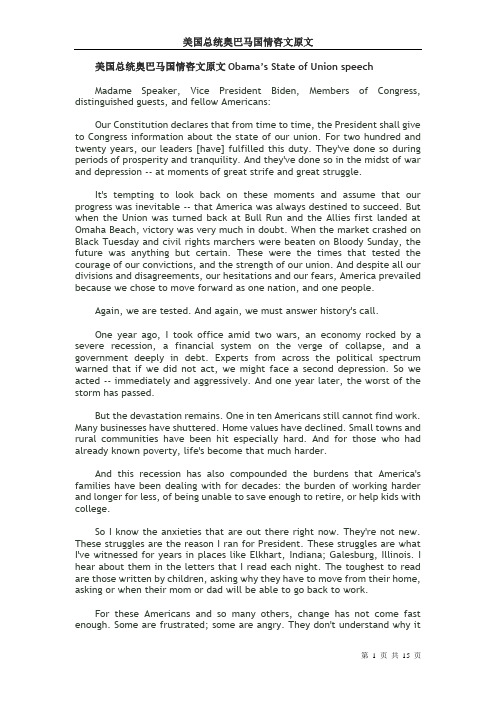
美国总统奥巴马国情咨文原文Obama’s State of Union speechMadame Speaker, Vice President Biden, Members of Congress, distinguished guests, and fellow Americans:Our Constitution declares that from time to time, the President shall give to Congress information about the state of our union. For two hundred and twenty years, our leaders [have] fulfilled this duty. They've done so during periods of prosperity and tranquility. And they've done so in the midst of war and depression -- at moments of great strife and great struggle.It's tempting to look back on these moments and assume that our progress was inevitable -- that America was always destined to succeed. But when the Union was turned back at Bull Run and the Allies first landed at Omaha Beach, victory was very much in doubt. When the market crashed on Black Tuesday and civil rights marchers were beaten on Bloody Sunday, the future was anything but certain. These were the times that tested the courage of our convictions, and the strength of our union. And despite all our divisions and disagreements, our hesitations and our fears, America prevailed because we chose to move forward as one nation, and one people.Again, we are tested. And again, we must answer history's call.One year ago, I took office amid two wars, an economy rocked by a severe recession, a financial system on the verge of collapse, and a government deeply in debt. Experts from across the political spectrum warned that if we did not act, we might face a second depression. So we acted -- immediately and aggressively. And one year later, the worst of the storm has passed.But the devastation remains. One in ten Americans still cannot find work. Many businesses have shuttered. Home values have declined. Small towns and rural communities have been hit especially hard. And for those who had already known poverty, life's become that much harder.And this recession has also compounded the burdens that America's families have been dealing with for decades: the burden of working harder and longer for less, of being unable to save enough to retire, or help kids with college.So I know the anxieties that are out there right now. They're not new. These struggles are the reason I ran for President. These struggles are what I've witnessed for years in places like Elkhart, Indiana; Galesburg, Illinois. I hear about them in the letters that I read each night. The toughest to read are those written by children, asking why they have to move from their home, asking or when their mom or dad will be able to go back to work.For these Americans and so many others, change has not come fast enough. Some are frustrated; some are angry. They don't understand why itseems like bad behavior on Wall Street is rewarded but hard work on Main Street isn't; or why Washington has been unable or unwilling to solve any of our problems. They're tired of the partisanship and the shouting and the pettiness. They know we can't afford it. Not now.So we face big and difficult challenges. And what the American people hope -- what they deserve -- is for all of us, Democrats and Republicans, to work through our differences; to overcome the numbing weight of our politics. For while the people who sent us here have different backgrounds, different stories, different beliefs, the anxieties they face are the same. The aspirations they hold are shared: a job that pays the bills; a chance to get ahead. Most of all, the ability to give their children a better life.And you know what else they share? They share a stubborn resilience in the face of adversity. After one of the most difficult years in our history, they remain busy building cars and teaching kids, starting businesses, and going back to school. They're coaching little league and helping their neighbors. One woman wrote to me and said, "We are strained but hopeful, struggling but encouraged."It's because of this spirit -- this great decency and great strength -- that I have never been more hopeful about America's future than I am tonight.Despite -- Despite our hardships, our union is strong. We do not give up. We do not quit. We do not allow fear or division to break our spirit. In this new decade, it's time the American people get a government that matches their decency, that embodies their strength. And tonight -- tonight I'd like to talk about how, together, we can deliver on that promise.It begins with our economy. Our most urgent -- Our most urgent task upon taking office was to shore up the same banks that helped cause this crisis. It was not easy to do. And if there's one thing that has unified Democrats and Republicans -- and everybody in between -- it's that we all hated the bank bailout. I hated it -- I hated it -- I hated it. You hated it. It was about as popular as a root canal.But when I ran for President, I promised I wouldn't just do what was popular -- I would do what was necessary. And if we had allowed the meltdown of the financial system, unemployment might be double what it is today. More businesses would certainly have closed. More homes would have surely been lost.So I supported the last Administration's efforts to create the financial rescue program. And when we took the program over, we made it more transparent and more accountable. And as a result, the markets are now stabilized, and we've recovered most of the money we spent on the banks.Most, but not all. To recover the rest, I've proposed a fee on the biggest banks.Now -- Now, I know Wall Street isn't keen on this idea, but if these firms can afford to hand out big bonuses again, they can afford a modest fee to pay back the taxpayers who rescued them in their time of need.Now, as we stabilized the financial system, we also took steps to get our economy growing again, save as many jobs as possible, and help Americans who had become unemployed. That's why we extended or increased unemployment benefits for more than 18 million Americans, made health insurance 65% cheaper for families who get their coverage through COBRA, and passed 25 different tax cuts.Now, let me repeat: We cut taxes.We cut taxes for 95% of working families.We cut taxes for small businesses.We cut taxes for first-time homebuyers.We cut taxes for parents trying to care for their children.We cut taxes for eight million Americans paying for college.(I thought I'd get some applause on that one.)As a result -- As a result, millions of Americans had more to spend on gas, and food, and other necessities -- all of which helped businesses keep more workers. And we haven't raised income taxes by a single dime on a single person. Not a single dime.Now, because of the steps we took, there are about two million Americans working right now who would otherwise be unemployed. 200,000 work in construction and clean energy. 300,000 are teachers and other education workers. Tens of thousands are cops, firefighters, correctional officers, first responders. And we're on track to add another one and a half million jobs to this total by the end of the year.The plan that has made all of this possible, from the tax cuts to the jobs, is the Recovery Act. That's right: the Recovery Act, also known as the Stimulus Bill. Economists on the left and the right say this bill has helped saved jobs and avert disaster. But you don't have to take their word for it: Talk to the small business in Phoenix that will triple its workforce because of the Recovery Act. Talk to the window manufacturer in Philadelphia who said he used to be skeptical about the Recovery Act, until he had to add two more work shifts just because of the business it created. Talk to the single teacher raising two kids who was told by her principal in the last week of school that because of the Recovery Act, she wouldn't be laid off after all.There are stories like this all across America. And after two years of recession, the economy is growing again. Retirement funds have started togain back some of their value. Businesses are beginning to invest again, and slowly [some] are starting to hire again.But I realize that for every success story, there are other stories -- of men and women who wake up with the anguish of not knowing where their next paycheck will come from; who send out resumes week after week and hear nothing in response. That is why jobs must be our number one focus in 2010. And that's why I'm calling for a new jobs bill tonight!Now, the true engine of job creation in this country will always be America's businesses. (I agree. Absolutely). But government can create the conditions necessary for businesses to expand and hire more workers. We should start where most new jobs do -- in small businesses, companies that begin when -- companies that begin when an entrepreneur -- when an entrepreneur takes a chance on a dream, or a worker decides its time she became her own boss.Through sheer grit and determination, these companies have weathered the recession and they're ready to grow. But when you talk to small business owners in places like Allentown, Pennsylvania or Elyria, Ohio, you find out that even though banks on Wall Street are lending again, they're mostly lending to bigger companies. Financing remains difficult for small business owners across the country -- even those that are making a profit.So tonight, I'm proposing that we take 30 billion dollars of the money Wall Street banks have repaid and use it to help community banks give small businesses the credit they need to stay afloat. I'm also proposing a new small business tax credit -- one that will go to over one million small businesses who hire new workers or raise wages. While we're at it, let's also eliminate all capital gains taxes on small business investment, and provide a tax incentive for all large businesses and all small businesses to invest in new plants and equipment.Next, we can put Americans to work today building the infrastructure of tomorrow. From -- From the first railroads to the interstate highway system, our nation has always been built to compete. There's no reason Europe or China should have the fastest trains, or the new factories that manufacture clean energy products.Tomorrow, I'll visit Tampa, Florida, where workers will soon break ground on a new high-speed railroad funded by the Recovery Act. There are projects like that all across this country that will create jobs and help our move our nation's goods, services, and information. We should put more Americans to work building clean energy facilities, and give -- and give rebates to Americans who make their homes more energy efficient, which supports clean energy jobs. And to encourage these and other businesses to stay within our borders, it is time to finally slash the tax breaks for companies that ship our jobs overseas and give those tax breaks to companies that create jobs right here in the United States of America.Now, the House has passed a jobs bill that includes some of these steps. As the first order of business this year, I urge the Senate to do the same -- and I know they will. They will. People are out of work. They're hurting. And they need our help. And I want a jobs bill on my desk without delay.But -- But the truth is, these steps still won't make up for the seven million jobs that we've lost over the last two years. The only way to move to full employment is to lay a new foundation for long-term economic growth, and finally address the problems that America's families have confronted for years.We can't afford another so-called economic "expansion" like the one from the last decade -- what some call the "lost decade" -- where jobs grew more slowly than during any prior expansion; where the income of the average American household declined while the cost of health care and tuition reached record highs; where prosperity was built on a housing bubble and financial speculation.From the day I took office, I've been told that addressing our larger challenges is too ambitious. Such an effort would be too contentious. I've been told that our political system is too gridlocked, and that we should just put things on hold for awhile. For those who make these claims, I have one simple question: How long should we wait? How long should America put its future on hold?You see -- You see, Washington has been telling us to wait for decades, even as the problems have grown worse. Meanwhile, China's not waiting to revamp its economy. Germany's not waiting. India's not waiting. These nations are -- they're not standing still. These nations aren't playing for second place. They're putting more emphasis on math and science. They're rebuilding their infrastructure. They're making serious investments in clean energy because they want those jobs.Well, I do not accept second-place for the United States of America.As hard as it may be, as uncomfortable and contentious as the debates may become, it's time to get serious about fixing the problems that are hampering our growth. Now, one place to start is serious financial reform. Look, I am not interested in punishing banks. I'm interested in protecting our economy. A strong, healthy financial market makes it possible for businesses to access credit and create new jobs. It channels the savings of families into investments that raise incomes. But that can only happen if we guard against the same recklessness that nearly brought down our entire economy.We need to make sure consumers and middle-class families have the information they need to make financial decisions. We can't allow financial institutions, including those that take your deposits, to take risks that threaten the whole economy. Now, the House has already passed financial reform with many of these changes. And -- And the lobbyists are trying to kill it. Well, we cannot let them win this fight. And if the bill that ends up on mydesk does not meet the test of real reform, I will send it back until we get it right. We've got to get it right.Next, we need to encourage American innovation. Last year, we made the largest investment in basic research funding in history, an investment -- an investment that could lead to the world's cheapest solar cells or treatment that kills cancer cells but leaves healthy ones untouched. And no area is more ripe for such innovation than energy. You can see the results of last year's investment in clean energy in the North Carolina company that will create 1200 jobs nationwide helping to make advanced batteries, or, in the California business that will put a thousand people to work making solar panels.But to create more of these clean energy jobs, we need more production, more efficiency, more incentives. And that means building a new generation of safe, clean nuclear power plants in this country. It means making tough decisions about opening new offshore areas for oil and gas development. It means continued investment in advanced biofuels and clean coal technologies. And yes, it means passing a comprehensive energy and climate bill with incentives that will finally make clean energy the profitable kind of energy in America.I am grateful to the House for passing such a bill last year. And this year -- this year, I am eager to help advance the bipartisan effort in the Senate. I know there have been questions about whether we can afford such changes in a tough economy. I know that there are those who disagree with the overwhelming scientific evidence on climate change. But -- But -- Here -- Here's the thing: Even if you doubt the evidence, providing incentives for energy efficiency and clean energy are the right thing to do for our future because the nation that leads the clean energy economy will be the nation that leads the global economy. And America must be that nation.[audio-to-text transcription accuracy verified to here: 27:02]Third, we need to export more of our goods. Because the more products we make and sell to other countries, the more jobs we support right here in America. So tonight, we set a new goal: We will double our exports over the next five years, an increase that will support two million jobs in America. To help meet this goal, we're launching a National Export Initiative that will help farmers and small businesses increase their exports, and reform export controls consistent with national security.We have to seek new markets aggressively, just as our competitors are. If America sits on the sidelines while other nations sign trade deals, we will lose the chance to create jobs on our shores. But realizing those benefits also means enforcing those agreements so our trading partners play by the rules. And that's why we will continue to shape a Doha trade agreement that opens global markets, and why we will strengthen our trade relations in Asia and with key partners like South Korea, Panama, and Colombia.Fourth, we need to invest in the skills and education of our people.This year, we have broken through the stalemate between left and right by launching a national competition to improve our schools. The idea here is simple: instead of rewarding failure, we only reward success. Instead of funding the status quo, we only invest in reform -- reform that raises student achievement, inspires students to excel in math and science, and turns around failing schools that steal the future of too many young Americans, from rural communities to inner-cities. In the 21st century, one of the best anti-poverty programs is a world-class education. In this country, the success of our children cannot depend more on where they live than their potential.When we renew the Elementary and Secondary Education Act, we will work with Congress to expand these reforms to all fifty states. Still, in this economy, a high school diploma no longer guarantees a good job. I urge the Senate to follow the House and pass a bill that will revitalize our community colleges, which are a career pathway to the children of so many working families. To make college more affordable, this bill will finally end the unwarranted taxpayer-subsidies that go to banks for student loans. Instead, let's take that money and give families a 10,000 dollar tax credit for four years of college and increase Pell Grants. And let's tell another one million students that when they graduate, they will be required to pay only ten percent of their income on student loans, and all of their debt will be forgiven after twenty years -- and forgiven after ten years if they choose a career in public service. Because in the United States of America, no one should go broke because they chose to go to college. And it's time for colleges and universities to get serious about cutting their own costs -- because they too have a responsibility to help solve this problem.Now, the price of college tuition is just one of the burdens facing the middle-class. That's why last year I asked Vice President Biden to chair a task force on Middle-Class Families. That's why we're nearly doubling the child care tax credit, and making it easier to save for retirement by giving every worker access to a retirement account and expanding the tax credit for those who start a nest egg. That's why we're working to lift the value of a family's single largest investment -- their home. The steps we took last year to shore up the housing market have allowed millions of Americans to take out new loans and save an average of 1,500 dollars on mortgage payments. This year, we will step up re-financing so that homeowners can move into more affordable mortgages. And it is precisely to relieve the burden on middle-class families that we still need health insurance reform.Now let's be clear -- I did not choose to tackle this issue to get some legislative victory under my belt. And by now it should be fairly obvious that I didn't take on health care because it was good politics.I took on health care because of the stories I've heard from Americans with pre-existing conditions whose lives depend on getting coverage; patients who've been denied coverage; and families -- even those with insurance -- who are just one illness away from financial ruin.After nearly a century of trying, we are closer than ever to bringing more security to the lives of so many Americans. The approach we've taken would protect every American from the worst practices of the insurance industry. It would give small businesses and uninsured Americans a chance to choose an affordable health care plan in a competitive market. It would require every insurance plan to cover preventive care. And by the way, I want to acknowledge our First Lady, Michelle Obama, who this year is creating a national movement to tackle the epidemic of childhood obesity and make our kids healthier.Our approach would preserve the right of Americans who have insurance to keep their doctor and their plan. It would reduce costs and premiums for millions of families and businesses. And according to the Congressional Budget Office -- the independent organization that both parties have cited as the official scorekeeper for Congress -- our approach would bring down the deficit by as much as 1 trillion dollars over the next two decades.Still, this is a complex issue, and the longer it was debated, the more skeptical people became. I take my share of the blame for not explaining it more clearly to the American people. And I know that with all the lobbying and horse-trading, this process left most Americans wondering what's in it for them.But I also know this problem is not going away. By the time I'm finished speaking tonight, more Americans will have lost their health insurance. Millions will lose it this year. Our deficit will grow. Premiums will go up. Patients will be denied the care they need. Small business owners will continue to drop coverage altogether. I will not walk away from these Americans, and neither should the people in this chamber.As temperatures cool, I want everyone to take another look at the plan we've proposed. There's a reason why many doctors, nurses, and health care experts who know our system best consider this approach a vast improvement over the status quo. But if anyone from either party has a better approach that will bring down premiums, bring down the deficit, cover the uninsured, strengthen Medicare for seniors, and stop insurance company abuses, let me know. Let's get it done. Let's get it done. Here's what I ask of Congress, though: Do not walk away from reform. Not now. Not when we are so close. Let us find a way to come together and finish the job for the American people.Now, even as health care reform would reduce our deficit, it's not enough to dig us out of a massive fiscal hole in which we find ourselves. It's a challenge that makes all others that much harder to solve, and one that's been subject to a lot of political posturing.So let me start the discussion of government spending by setting the record straight. At the beginning of the last decade, America had a budget surplus of over 200 billion dollars. By the time I took office, we had a one year deficit of over 1 trillion dollars and projected deficits of 8 trillion dollars overthe next decade. Most of this was the result of not paying for two wars, two tax cuts, and an expensive prescription drug program. On top of that, the effects of the recession put a 3 trillion dollar hole in our budget. That was before I walked in the door. I'm just stating the facts.Now if we had taken office in ordinary times, I would have liked nothing more than to start bringing down the deficit. But we took office amid a crisis, and our efforts to prevent a second Depression have added another 1 trillion dollars to our national debt. That, too, is a fact.I am absolutely convinced that was the right thing to do. But families across the country are tightening their belts and making tough decisions. The federal government should do the same. So tonight, I'm proposing specific steps to pay for the 1 trillion that it took to rescue the economy last year.Starting in 2011, we are prepared to freeze government spending for three years. Spending related to our national security, Medicare, Medicaid, and Social Security will not be affected. But all other discretionary government programs will. Like any cash-strapped family, we will work within a budget to invest in what we need and sacrifice what we don't. And if I have to enforce this discipline by veto, I will.We will continue to go through the budget line by line, page by page, to eliminate programs that we can't afford and don't work. We've already identified 20 billion dollars in savings for next year. To help working families, we will extend our middle-class tax cuts. But at a time of record deficits, we will not continue tax cuts for oil companies, for investment fund managers, and for those making over 250,000 dollars a year. We just can't afford it.Now, even after paying for what we spent on my watch, we will still face the massive deficit we had when I took office. More importantly, the cost of Medicare, Medicaid, and Social Security will continue to skyrocket. That's why I've called for a bipartisan, Fiscal Commission, modeled on a proposal by Republican Judd Gregg and Democrat Kent Conrad. This can't be one of those Washington gimmicks that lets us pretend we solved a problem. The Commission will have to provide a specific set of solutions by a certain deadline. Now, yesterday, the Senate blocked a bill that would have created this commission. So I will issue an executive order that will allow us to go forward, because I refuse to pass this problem on to another generation of Americans. And when the vote comes tomorrow, the Senate should restore the pay-as-you-go law that was a big reason why we had record surpluses in the 1990s.Now, I know that some in my own party will argue that we cannot address the deficit or freeze government spending when so many are still hurting. And I agree, which is why this freeze will not take effect until next year, when the economy is stronger. That's how budgeting works. But understand -- understand, if we do not take meaningful steps to rein in our debt, it could damage our markets, increase the cost of borrowing, andjeopardize our recovery -- all of which could have an even worse effect on our job growth and family incomes.From some on the right, I expect we'll hear a different argument: If we just make fewer investments in our people, extend tax cuts for wealthier Americans, eliminate more regulations, and maintain the status quo on health care, our deficits will go away. The problem is, that's what we did for eight years. That's what helped lead us into this crisis. It's what helped lead to these deficits. We can't do it again.Rather than fight the same tired battles that have dominated Washington for decades, it's time to try something new. Let's invest in our people without leaving them a mountain of debt. Let's meet our responsibility to the citizens who sent us here. Let's try common sense -- a novel concept.To do that, we have to recognize that we face more than a deficit of dollars right now. We face a deficit of trust -- deep and corrosive doubts about how Washington works that have been growing for years. To close that credibility gap we must take action on both ends of Pennsylvania Avenue to end the outsized influence of lobbyists; to do our work openly; to give our people the government they deserve.Now, that's what I came to Washington to do. That's why -- for the first time in history -- my Administration posts our White House visitors online. That's why we've excluded lobbyists from policy-making jobs or seats on federal boards and commissions.But we can't stop there. It's time to require lobbyists to disclose each contact they make on behalf of a client with my Administration or Congress. And it's time to put strict limits on the contributions that lobbyists give to candidates for federal office. With all due deference, last week the Supreme Court reversed a century of law to open the floodgates for special interests -- including foreign corporations -- to spend without limit in our elections. Well I don't think American elections should be bankrolled by America's most powerful interests, or worse, by foreign entities. They should be decided by the American people, and I'd urge Democrats and Republicans to pass a bill that helps to right this wrong.I'm also calling on Congress to continue down the path of earmark reform -- Democrats and Republicans, Democrats and Republicans. Look, you have trimmed some of this spending and embraced some meaningful change. But restoring the public trust demands more. For example, some members of Congress post some earmark requests online. Tonight, I'm calling on Congress to publish all earmark requests on a single website before there's a vote so that the American people can see how their money is being spent.Of course, none of these reforms will even happen if we don't also reform how we work with one another.。
美国全球战略的调整

美国全球战略的调整与影响美国全球战略从开始酝酿到正式形成,经过了一个从无到有、从支离破碎到系统完整、从军事战略到全球战略的发展过程,大体上可分为酝酿、初步形成、正式形成以及冷战后时期四个阶段。
这种阶段性划分的依据,是国际战略力量对比消长变化的结果,更反映出美国在国内政治经济形势的驱使下从本土扩张到海外扩张、从海外扩张到全球扩张的历史进程。
一、首要任务将国家安全列为全球战略的首要任务布什政府全球战略的调整,首先表现在战略侧重点的调整上。
同克林顿把对外经济关系列为外交的首要支柱不同,布什政府把加强美国的国家安全列为其全球战略的首要目标。
“9·11”后布什政府发表的一系列政策报告和领导人讲话,都深深刻上了右翼保守、单边主义、追求绝对霸权的印记。
在当前,美国要全力以赴打击恐怖主义和伊斯兰极端势力;而从长远来看,还要阻止任何国家挑战美国“领导地位”的企图或努力。
2002年9月发表的国家安全战略报告,将恐怖主义和大规模杀伤性武器及其技术的结合确定为美国面临的“最严重威胁”,提出美国“最迫切的任务”是“摧毁全球范围内的恐怖主义组织以及任何试图获得或使用大规模毁灭性武器及其制造材料的恐怖主义分子或支持恐怖主义的国家”。
把国际恐怖主义和和所谓“邪恶轴心”挂钩,是布什的国家安全政策的一个重要特征。
2002年1月布什在国会发表的“国情咨文”提出,恐怖主义是美国国家安全的主要威胁,还指称伊拉克、伊朗和朝鲜构成了世界上的“邪恶轴心”,而且“他们可能向恐怖主义分子提供这些武器,让他们得到发泄仇恨的手段”。
“事实证明,支持恐怖主义的国家与试图开发或获得大规模杀伤性武器的国家是同样一些国家”,这样,布什政府就更加明确地把大规模杀伤性武器的扩散、“邪恶国家”和恐怖主义联系起来,提出要防止它们“联姻”。
后来美国还指责古巴、利比亚、叙利亚、苏丹支持恐怖主义活动,把这些国家也列入“黑名单”。
美国用武力推翻了萨达姆政权以后,又把防止大规模杀伤性武器扩散的目标锁定在伊朗和朝鲜两个国家身上。
- 1、下载文档前请自行甄别文档内容的完整性,平台不提供额外的编辑、内容补充、找答案等附加服务。
- 2、"仅部分预览"的文档,不可在线预览部分如存在完整性等问题,可反馈申请退款(可完整预览的文档不适用该条件!)。
- 3、如文档侵犯您的权益,请联系客服反馈,我们会尽快为您处理(人工客服工作时间:9:00-18:30)。
2002年国情咨文布什总统于2002年1月29日在美国国会首次发表国情咨文。
以下是布什总统国情咨文的全文:(全文开始)白宫新闻秘书办公室2002年1月29日布什总统发表国情咨文美国国会华盛顿哥伦比亚特区总统:议长先生、切尼副总统、各位国会议员,贵宾们、同胞们:我们今晚在这里聚会之时,我们的国家正处于战争状态,我们的经济陷入衰退,文明世界面临着空前的危险。
然而,我们的国情却从未像现在这样强盛。
(掌声)我们上次聚集在一起的时候正处于震惊和苦难的时刻。
在短短的四个月中,我们的国家抚慰了受害者,开始重建纽约和五角大楼,结成了一个伟大的联盟,抓获、逮捕并打击世界上数以千计的恐怖主义分子,摧毁了阿富汗的恐怖主义训练营地,使一个国家的人民不再忍受饥饿,使一个国家从残暴的压迫下获得了自由。
(掌声)美国国旗再次在我国驻喀布尔使馆上空飘扬。
一度盘踞在阿富汗的恐怖主义分子如今被关押在关塔那摩湾。
(掌声)那些驱使追随者卖命的恐怖主义头目们为了保住自己的性命正在狼狈逃窜。
(掌声)美国和阿富汗如今已成为反恐怖的盟友─我们在阿富汗的重建工作中将成为夥伴─今晚,我们欢迎在已获得解放的阿富汗担任过渡时期领导人的尊贵来宾:哈米德·卡尔扎伊主席。
(掌声)上次我们在这个会议厅聚会时,阿富汗的母亲和女儿们正被囚禁在她们自己的家中,被禁止工作或上学。
今天,妇女获得了自由,并在阿富汗新政府中任职。
让我们欢迎新任妇女事务部长,西玛·萨马尔博士。
(掌声)我们所取得的进展归功于阿富汗人民的精神、我们的联盟的决心和美国军队的力量。
(掌声)当我命令我们的军队行动起来时,我对他们的勇气和能力充满信心。
今晚,由于有他们,我们正在取得反恐怖战争的胜利。
(掌声)我国武装力量中的男女军人现已向美国的每一个敌人发出明确的警告:不管你是在七千英里之外,还是远隔重洋和大陆;也不管你是在山顶还是躲在洞中,都无法逃避我国正义的惩罚。
(掌声)对很多美国人来说,这四个月带来了永远无法彻底消弥的悲伤和痛苦。
一位退休的消防队员每天都回到世贸中心遗址,以便能感受到同他在那里遇难的两个儿子离得更近一点。
在纽约的一个悼念场所,一个小男孩给他死去的父亲留下了自己的橄榄球和一张字条,上面写着:亲爱的爸爸,请你把它带到天堂去。
我不想再玩橄榄球了,除非有一天我还能和你一起玩。
香农·斯潘的丈夫迈克尔是中央情报局官员和海军陆战队队员,他在马扎里沙里夫牺牲。
她上个月在她丈夫的墓前与他诀别时说:"永远忠诚,我的爱人。
"今晚,我们把香农请到了这里。
(掌声)香农,我向你和所有失去亲人的人保证,我们的事业是正义的,我们的国家永远不会忘记迈克尔和所有为自由献出生命者的功绩。
我们的事业是正义的事业,我们的事业将继续进行。
我们在阿富汗的发现证实了我们最严重的担忧,并向我们显示了今后任务的实际规模。
当我们的敌人在录像带中因无辜者丧生而大笑时,我们看到了他们深刻的仇恨。
他们的仇恨有多深,他们阴谋破坏的行径就有多疯狂。
我们发现了美国核电站和公共水利设施的示意图、制造化学武器的详细说明、侦察美国城市的地图以及对美国和世界各地的地标的详尽说明。
我们在阿富汗的发现证实,我们的反恐怖战争远非就在那里结束,这仅仅是个开端。
9月11日的19名劫机分子大部份都在阿富汗营地接受过训练,另有成千上万的人也在那里受过训。
数以千计受过杀人方法训练并常常得到无法无天的政权支持的危险杀手现在遍布世界各地,他们像定时炸弹一样,随时可能在没有任何警告的情况下爆炸。
由于我们的执法人员和联盟夥伴的努力,已有数以百计的恐怖主义分子被逮捕,然而仍有数以万计受过训练的恐怖主义分子逍遥法外。
这些敌人把整个世界视作战场,无论他们在哪里,我们都要追踪到底。
(掌声)只要训练营还在活动,只要还有国家庇护恐怖主义分子,自由就处于危险之中,美国及其盟友绝不能,也绝不会听之任之。
(掌声)我们的国家在追求两大目标的过程中将继续坚定不移,坚韧不拔,坚持不懈。
首先,我们将使恐怖主义营地停止活动,粉碎恐怖主义活动计划,并将恐怖主义分子绳之以法。
第二,我们必须防止寻求化学、生物和核武器的恐怖主义分子和政权威胁美国和全世界。
(掌声)我们的军队已经摧毁了阿富汗的恐怖主义训练营地,然而恐怖主义训练营地至少在十几个国家继续存在。
包括哈马斯、真主党、伊斯兰圣战组织、穆罕默德军等组织在内的地下恐怖主义网在偏远的丛林和沙漠地区开展活动,在大城市中心地区藏身。
最引人注目的军事行动在阿富汗进行,但美国也在其它地方开展行动。
目前,我们的军队在菲律宾帮助训练该国的军队追捕曾将一名美国人处死并继续扣押人质的恐怖分子基层组织。
我们的军人与波斯尼亚政府合作抓获了策划轰炸我国使馆的恐怖主义分子。
我们的海军在非洲海岸巡逻制止武器运输和在索马里建立恐怖主义营地。
我的希望是,所有的国家都响应我们的呼吁,铲除对他们的国家和我国造成威胁的恐怖主义寄生物。
许多国家正采取强有力的行动。
巴基斯坦现在正在打击恐怖。
我钦佩穆沙拉夫总统发挥的领导作用。
(掌声)但是有些政府在恐怖面前会表现胆怯。
毫无疑问的是:如果它们不采取行动,美国就要采取行动。
我们的第二个目标是,防止为恐怖提供庇护的政权使用大规模毁灭性武器威胁美国或我们的朋友和盟国。
其中有些政权自9月11日以来始终相当沉默。
但是我们了解它们的真正本性。
北韩是一个以导弹和大规模毁灭性武器武装起来,同时让自己的国民忍饥挨饿的政权。
伊朗猖狂地力图获得这些武器并出口恐怖,同时不得人心的一小撮人在压制伊朗人民对自由的希望。
伊拉克继续叫嚣对美国的仇恨并支持恐怖。
伊拉克政权10多年来一直在策划发展炭疽病菌和神经性毒气及核武器。
这是一个已经使用毒气杀害本国公民的政权,使数千人被杀害,留下母亲们的尸体紧紧偎依着自己死去的孩子的惨状。
这是一个同意让国际社会进行核查工作,却又将核查人员赶走的政权。
这是一个要对文明世界掩盖某些东西的政权。
这类国家和它们的恐怖主义同夥构成了邪恶的轴心,图谋武装起来威胁世界和平。
这些政权妄图获得大规模毁灭性武器,从而构成了日趋严重的极大危险。
他们可能向恐怖主义分子提供这些武器,让他们得到发泄仇恨的手段。
他们可能攻击我们的盟友或妄图胁迫美国。
在以上任何一种情况下,不闻不问的代价都将是灾难性的。
我们将同我们的联盟密切合作,不让恐怖主义分子和支持他们的国家得到制造和运载大规模毁灭性武器所需的材料、技术和专门知识。
我们将研制并部署有效的导弹防御系统以保护美国和美国的盟友,对抗突然袭击。
所有的国家都应当知道:美国将采取一切必要行动来确保我们的国家安全。
我们将审慎从事,但时不我待。
当险情迭起时,我不会消极等待。
当危险日益迫近时,我不会坐视不顾。
美利坚合众国绝不允许世界上最危险的政权用世界上毁灭性最大的武器来威胁我们。
(掌声)我们的反恐怖战争进展良好,但这仅仅是个开端。
这场行动或许无法在我们预定的时间内结束,但我们必须不失时机采取行动。
我们不能半途而废。
如果我们现在停止─让恐怖主义营地完好无损,对恐怖主义国家不加制止─我们的安全感就将是虚假和短暂的。
历史召唤美国和美国的盟友行动起来,为自由而战既是我们的责任,也是我们的殊荣。
(掌声)我国的安全必须自始至终是我们的第一要务,这将反映在我向国会提交的预算中。
我的预算支持美国的三大目标:我们将赢得这场战争,我们将捍卫我们的国土,我们将重振我国经济。
9月11日事件激发美国表现出了最优秀的品质,也激发国会展示其最佳风貌。
我同美国人民一起,为你们的团结和信念而鼓掌。
(掌声) 现在,应当让美国人看到这种精神也体现在解决国内问题之中。
我为身为我党成员而骄傲─但当我们为赢得战争的胜利采取行动,保护我国人民和在美国创造工作机会时,头等重要的是,我们不是以共和党人的身份,也不是以民主党人的身份,而必须以美国人的身份采取行动。
(掌声)打这场战争的开支巨大。
我们已经每月开支10多亿美元─每天需要3,000多万美元─我们必须为未来的行动做好准备。
在阿富汗,事实证明昂贵的精确武器能击败敌人和挽救无辜的生命,我们需要更多这样的武器。
我们需要更换老化的飞机,使我们的军队有更大的灵活性,迅速和安全地把我们的部队派遣到世界任何地方。
我们的男女军人应该有最好的武器、最好的设备和最好的训练,他们也应该再次获得加薪。
(掌声)我的预算要求国防开支得到20年来最大幅度的增长,这是因为,尽管自由和安全的代价高昂,但是再高也值得。
为了捍卫我们的国家,无论花多少代价,我们都将承担。
(掌声)我的预算的下一个重要事项是尽一切可能保护我国公民并加强我国的力量,避免遭受又一场攻击的持续威胁。
9月11日事件发生以后,我们不会因为时间的推移而更安全,除非我们接受教训采取行动。
美国不能再依靠浩瀚海洋的保护。
我们只有通过在海外采取强有力的行动,在国内提高警惕才能得到保护。
我的预算中用于可持续的国土安全战略的经费几乎翻了一番,重点在于四个关键领域:制止生物恐怖主义、应急反应、机场和边境安全以及改善情报工作。
我们将研制抗炭疽病和其它致命疾病的疫苗。
我们将增加拨款,帮助各州和各社区为我们英勇的警察和消防队员提供培训和设备。
(掌声) 我们将改善收集和交换情报的工作,在我们的边境扩大巡逻,增强空中旅行的安全并利用技术记录来访者在美国出入境的情况。
国土安全不仅将使美国更强大,而且还能在很多方面改善美国的状况。
防止生物恐怖主义的研究成果将改善公共卫生。
警察和消防部门的实力增强将意味着街道更安全。
加强边境执法工作有助于打击非法毒品。
(掌声) 当政府为更好地保护我们的国土而努力时,美国还将继续依靠公民们警觉的耳目来获得帮助。
在圣诞节前几天,一位航空客机服务员发现有一名乘客点着了一根火柴。
机组人员和机上乘客很快制服了此人,此人曾在"基地"组织受过训练,而且携带有爆炸物。
那架客机上的人警惕性高,他们因此拯救了近200人的生命。
今晚,让我们欢迎客机服务员赫米斯·穆塔尔迪耶和克里斯蒂娜·琼斯,并向她们表示感谢。
(掌声)在我们为我国国家安全和国土安全提供拨款后,我的预算中的最后一项重点是美国人民的经济保障。
(掌声)为实现这些伟大的国家目标─打赢战争、保护国土和重振我国经济─我们的预算将出现赤字,但只要国会控制支出并采取财政上负责的方式,赤字将是小额和短期的。
(掌声)我们有明确的重点,我们还必须在国内拿出我们在国外表现出来的同样的信念和决心:我们将取得战争的胜利,并将战胜衰退。
(掌声)失去了工作的美国人需要我们的帮助,我支持扩大失业福利和直接提供医疗保险援助。
(掌声) 然而,美国工人想要得到的不止是失业救济─他们希望有稳定的工资收入。
(掌声) 美国工人有了工作,美国就会繁荣,所以,我的经济安全计划可以概括为两个字:工作。
